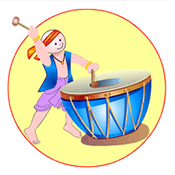
Dimdima
Online Children's Magazine from India

Dimdima
Online Children's Magazine from India
| The Empire Builders |
|
|
|
They also exploited the rivalry and in-fighting among the Indian rulers to their advantage.
With the subjugation of India, the English East India Company achieved monopoly of trade and control over the financial resources in India.
In the process, by the beginning of the 19th century, the people of the country had been reduced to utter poverty. While they found it difficult to pay an eight anna increase in the salt tax, the Company Sircar felt it could not afford to forgo it.
Apparently the Company Sircar agreed with the Indian saying that drops of water coming together make an ocean.
| |||
|
Dimdima is the Sanskrit word for ‘drumbeat’. In olden days, victory in battle was heralded by the beat of drums or any important news to be conveyed to the people used to be accompanied with drumbeats.
Bharatiya Vidya Bhavan
K. M Munshi Marg,
Chowpatty, Mumbai - 400 007
email : editor@dimdima.com
Bharatiya Vidya Bhavan
505, Sane Guruji Marg,
Tardeo, Mumbai - 400 034
email : promo@dimdima.com
Dimdima.com, the Children's Website of Bharatiya Vidya Bhavan launched in 2000 and came out with a Printed version of Dimdima Magazine in 2004. At present the Printed Version have more than 35,000 subscribers from India and Abroad.